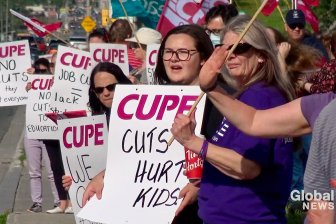From the back of a pickup truck parked in front of Queen’s Park, a megaphone posed a loud question to the crowd: “If we don’t get it?”
“Shut it down,” came the response from hundreds of union members protesting on the lawns of Ontario’s legislature.
The protest — a sign of growing union unrest with the Ford government — was the result of an emergency rally called by the Ontario Federation of Labour on Tuesday to stand in solidarity with education workers preparing to strike on Friday.
Members of Ontario’s teaching unions, paramedics and nurses marched from the Ministry of Labour’s offices in downtown Toronto to the provincial legislature.
The demonstration came as education workers represented by the Canadian Union of Public Employees (CUPE) prepare to strike after stalled contract negotiations with the province.
Legislation introduced by the Ford government will outlaw Friday’s strike and impose a contract on CUPE members if it is passed. It includes use of the notwithstanding clause to avoid a court challenge.
The notwithstanding clause — or Section 33 of the Charter of Rights and Freedoms — gives provincial legislatures or Parliament the ability, through the passage of a law, to override certain portions of the charter for a five-year term.
Unions say the legislation effectively take away their right to bargain — and labour groups in Ontario are digging in for a long and painful standoff with the government.
“As a result of the actions of the government with this legislation, (we are) at a crossroads for the entire labour movement in terms of workers’ rights — not just in Ontario, but I would say across the country,” Fred Hahn, president of CUPE, told Global News.
While CUPE’s education workers — which include librarians, custodians and early childhood educators — face the most immediate hurdle, other unions fear they will be next.
Karen Littlewood, president of the Ontario Secondary School Teachers’ Federation (OSSTF), said the new legislation made negotiations “very challenging.”
Although secondary school teachers will be working on Friday as CUPE members walk out of classrooms, Littlewood said many would join picket lines before and after work in solidarity.
“It’s going to be a long, hard struggle because the government has a massive majority, they feel very empowered,” she told Global News. “Obviously, they have no problem using the notwithstanding clause.”
Laura Walton, president of CUPE’s Ontario School Board Council of Unions, said the government’s legislation went far beyond her members.
“I think what you saw tonight is just the surface — workers are angry,” she said on the steps of Queen’s Park. “They have actually made an attack on workers in general.”
Even among labour organizations that backed the Ford government in June’s provincial election, there are signs of dissent.
The Laborers’ International Union of North America (LiUNA), representing mainly construction workers, endorsed the PC Party ahead of the election, but addressed a stinging letter to Minister of Education Stephen Lecce on Tuesday.
The union told the education minister that his new legislation “sets a dangerous precedent that aims to erode respect for collective bargaining rights and unionized labour in Ontario.”

Teachers, who are also negotiating new contracts with the Ontario government, fear what the new legislation could mean for them.
“If they can do this to CUPE — if they can pass one of the most draconian pieces of anti-labour legislation that we have ever seen in this province — I would say, Canada-wide, they can absolutely do this with teachers,” Helen Victoros, president of the Elementary Teachers of Toronto, said.
— with files from The Canadian Press



Post a Comment